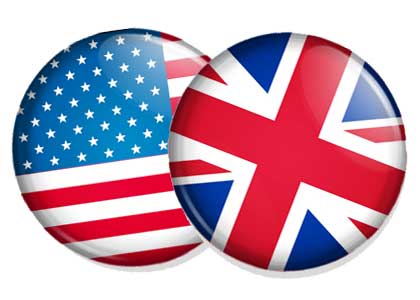 Teaching English on the continent isn't as straightforward as, let's say, teaching French over here.
Teaching English on the continent isn't as straightforward as, let's say, teaching French over here. There is one dominant variation of the French language on this planet - the so-called "Standard French", as regulated by the Académie Française. Much like the British, Spanish, Dutch and Germans, the French set sail to conquer various parts of globe, leaving traces of their language in Canada, Morocco and Madagascar to name a few, which after mixing with the native languages formed different dialects of French; but none of these countries have gathered enough economic and political power to convince other nations that their version of French is worth learning over standard French. For those learning English, however, there is a choice: British English (BrEn) or American English (AmEn).
Whereas British English was undoubtedly the favoured version until the 20th century, political and cultural influences from the United States have started to alter foreign perceptions of the English language, providing a choice of dialect to learn. So, it's interesting to see what kind of people learn which version and why.
As an English language assistant in France, it was evident that British English was the norm there. The textbooks use our spellings and our vocabulary, and audio tapes featured UK accents. The French teachers of English generally had a southern British accent.
American assistants doing the same job would often complain about this, insisting that their dialect should be taught, but to what end when France right is next door to the UK, is one of its largest trading partners and receives so many tourists from these isles? A Frenchman is incredibly more likely to encounter a Brit in his country (or a native English speaker with a dialect more similar to BrEn than AmEn, such as someone from Ireland or Australia) than a United Statesian, and is more likely to travel to the UK than the US. Equally, I wouldn't expect to hear much British English in Mexico.
Of course, outside of school, students are exposed to both British and American culture through television, film and music, meaning that they are often inconsistent in their language usage. In the same essay, they might use the world 'colour', but then use 'honor'. I've even seen the same word spelt differently in the same work, once ending in -ize and then in -ise. A mix of British and American vocabulary in the same piece of writing is not uncommon for students of English. This is not to be confused with Canadian English.
This seems to be the case for the Netherlands too, with British English being taught at school, and some cultural influences from American English. Again, it would make sense for the Dutch to speak BrEn. There are probably more Brits in the centre of Amsterdam than Dutch people on any given Saturday night.
When in Spain, it was clear to see why British English prevailed. Think of how many tourists we send to the Costas and their islands every year! There seemed to be the odd discrepancy about, such as -ize spelling rather than -ise, on translations, but in my opinion, we can put this down to both Spanish influence (e.g. realizar = realise) and maybe the fact that Oxford Dictionaries prefer the -ize ending to reflect its Greek etymology.
In Germany, it's more complicated. Deutschland seems to be split right down the middle on the issue. Areas that call for a higher register seem to favour BrEn, such as political situations due to matters concerning the European Union. BrEn also appears to dominate everyday society. When I was in Munich, I saw an example of the hated phenomenon known as Denglisch, that is English words adopted into German. Just after getting off the U-Bahn (the metro), I saw a sign for 'der Lift'. Not 'der Elevator' (or 'der Aufzug' - the correct German word).
That said, the world of technology in Germany has largely taken on AmEn. Siemens, bizarrely, even uses American spellings on its .co.uk website. Is this the result of American occupation of much of the country after WWII? After all, Germany was divided into four occupied zones in 1945, with the Russians, French and British each governing a zone as well. The Americans were in charge of southern Germany, where Siemens started up and still has its head office. This could well be a happy coincidence, and is more likely to be due to the American domination in the global technology domain.
But, this is where localisation comes in. Global companies trying to reach out to an English-speaking audience must treat these two varieties as separate languages and offer their website in both British and American English, and correspond with their clients and suppliers according to their native English. Otherwise, they are automatically alienating half of their English-speaking audience.
In my opinion British English is more common. Also in Poland where I live. However, it happens that even English teachers are mixing British and American variation (eg. luggage and baggage).
ReplyDeleteAs to Americans...yes, they are absolutely convinced the Europeans should learn AmEn. The New Yorker I met was quite surprised by the reason we choose BrEn.
Yes, Americans would naturally say that, probably without taking into account the historical, political and economic factors. They often forget where their "language" orignates from.
ReplyDeleteIt's a comparable situation with Spanish. That's why we learn Iberian Spanish in Europe and in turn it would make far more sense to teach South American versions of Spanish in the US than the Peninsular version.